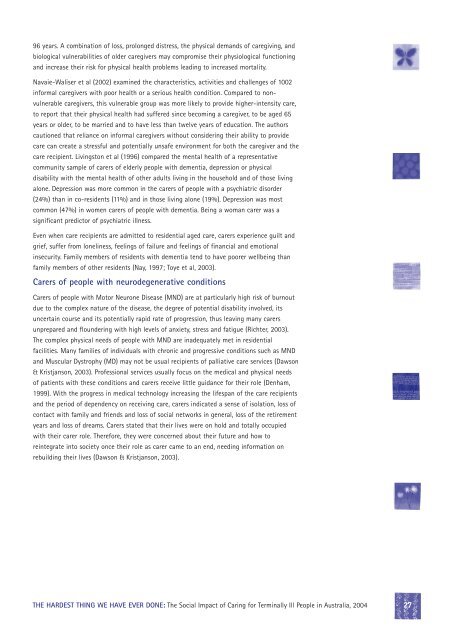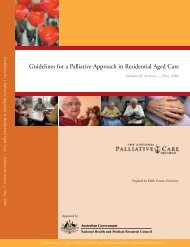The hardest thing we have ever done - Palliative Care Australia
The hardest thing we have ever done - Palliative Care Australia
The hardest thing we have ever done - Palliative Care Australia
Create successful ePaper yourself
Turn your PDF publications into a flip-book with our unique Google optimized e-Paper software.
96 years. A combination of loss, prolonged distress, the physical demands of caregiving, and<br />
biological vulnerabilities of older caregivers may compromise their physiological functioning<br />
and increase their risk for physical health problems leading to increased mortality.<br />
Navaie-Waliser et al (2002) examined the characteristics, activities and challenges of 1002<br />
informal caregivers with poor health or a serious health condition. Compared to nonvulnerable<br />
caregivers, this vulnerable group was more likely to provide higher-intensity care,<br />
to report that their physical health had suffered since becoming a caregiver, to be aged 65<br />
years or older, to be married and to <strong>have</strong> less than t<strong>we</strong>lve years of education. <strong>The</strong> authors<br />
cautioned that reliance on informal caregivers without considering their ability to provide<br />
care can create a stressful and potentially unsafe environment for both the caregiver and the<br />
care recipient. Livingston et al (1996) compared the mental health of a representative<br />
community sample of carers of elderly people with dementia, depression or physical<br />
disability with the mental health of other adults living in the household and of those living<br />
alone. Depression was more common in the carers of people with a psychiatric disorder<br />
(24%) than in co-residents (11%) and in those living alone (19%). Depression was most<br />
common (47%) in women carers of people with dementia. Being a woman carer was a<br />
significant predictor of psychiatric illness.<br />
Even when care recipients are admitted to residential aged care, carers experience guilt and<br />
grief, suffer from loneliness, feelings of failure and feelings of financial and emotional<br />
insecurity. Family members of residents with dementia tend to <strong>have</strong> poorer <strong>we</strong>llbeing than<br />
family members of other residents (Nay, 1997; Toye et al, 2003).<br />
<strong>Care</strong>rs of people with neurodegenerative conditions<br />
<strong>Care</strong>rs of people with Motor Neurone Disease (MND) are at particularly high risk of burnout<br />
due to the complex nature of the disease, the degree of potential disability involved, its<br />
uncertain course and its potentially rapid rate of progression, thus leaving many carers<br />
unprepared and floundering with high levels of anxiety, stress and fatigue (Richter, 2003).<br />
<strong>The</strong> complex physical needs of people with MND are inadequately met in residential<br />
facilities. Many families of individuals with chronic and progressive conditions such as MND<br />
and Muscular Dystrophy (MD) may not be usual recipients of palliative care services (Dawson<br />
& Kristjanson, 2003). Professional services usually focus on the medical and physical needs<br />
of patients with these conditions and carers receive little guidance for their role (Denham,<br />
1999). With the progress in medical technology increasing the lifespan of the care recipients<br />
and the period of dependency on receiving care, carers indicated a sense of isolation, loss of<br />
contact with family and friends and loss of social networks in general, loss of the retirement<br />
years and loss of dreams. <strong>Care</strong>rs stated that their lives <strong>we</strong>re on hold and totally occupied<br />
with their carer role. <strong>The</strong>refore, they <strong>we</strong>re concerned about their future and how to<br />
reintegrate into society once their role as carer came to an end, needing information on<br />
rebuilding their lives (Dawson & Kristjanson, 2003).<br />
THE HARDEST THING WE HAVE EVER DONE: <strong>The</strong> Social Impact of Caring for Terminally Ill People in <strong>Australia</strong>, 2004<br />
27
















